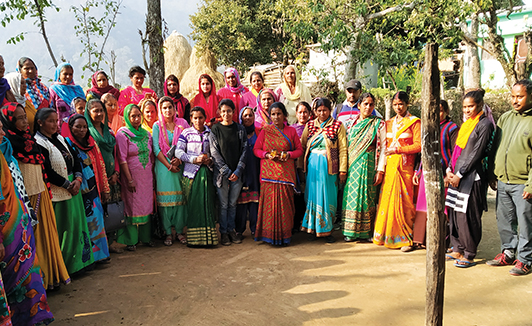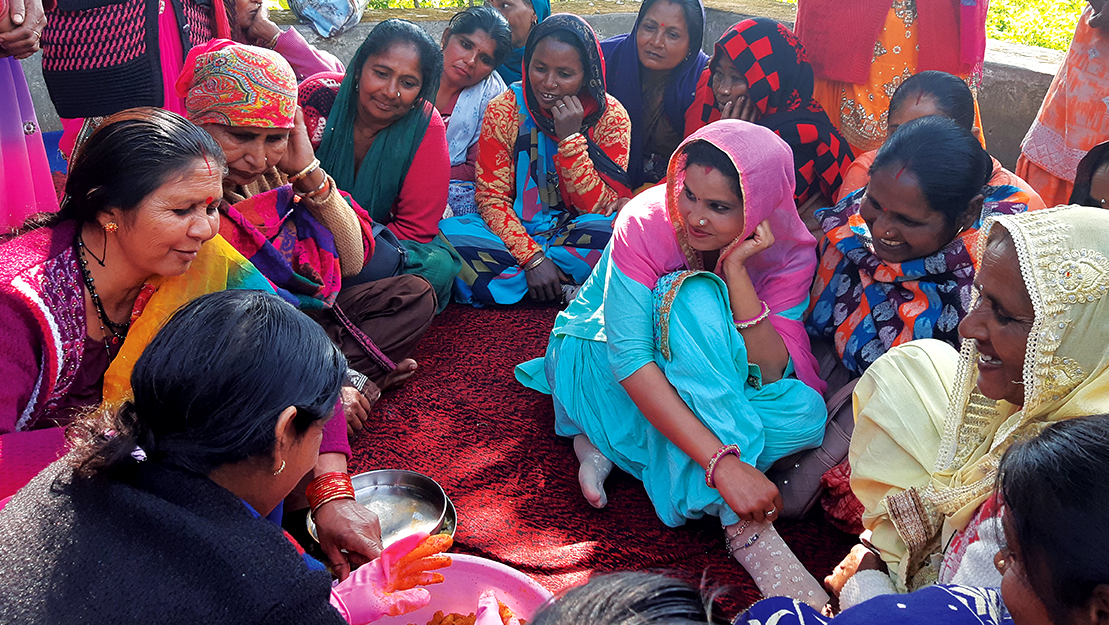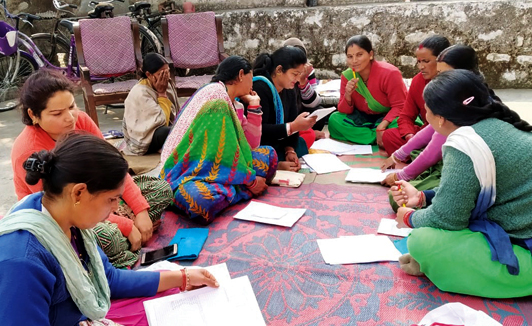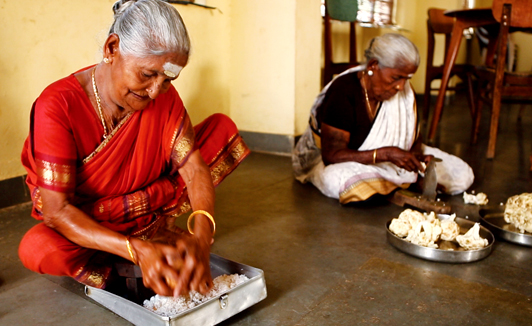The success of our business is incomplete until we can share the fruits with the community and conserve the environment that makes all business activity possible. These are the purposes served by our Corporate Social Responsibility programme.

The ICICI Securities sustainability philosophy is based on the belief that what’s good for stakeholders is good for us. As a business that has always taken a long-term view, our actions target sustainable socio-economic development. Our Corporate Social Responsibility programme is focussed on livelihood generation ability, financial literacy, health care, women’s empowerment, welfare for the needy, and conservation of natural resources.
During the year, we initiated eight activities across five areas directly or through partners. The activities were in the areas of skill development; creation of jobs through start-up incubation; health care and preventive health care; women’s empowerment; and welfare of senior citizens.


We partner with ICICI Foundation For Inclusive Growth, ICICI Group’s CSR arm, on its various initiatives. During the year, ICICI Foundation’s various activities across the nation in skill development and rural livelihood generation, impacted ~0.12 million lives. These initiatives were:
Vocational training through skill academies is a national initiative to create sustainable livelihood opportunities for the underprivileged youth. The training is provided free of cost and all the youth who successfully complete the training are provided employment opportunities.
The objective of the rural livelihood programme is to provide sustainable livelihood to the rural population of the country within their existing ecosystem and thereby expand the reach of CSR activities. Under this programme, vocational training is provided based on needs of the local economy and the aspirations of the villagers. The training is free of cost. To ensure a steady market for the products and services, ICICI Foundation assists the trainees in forging market linkages with small producers, local firms and cooperatives and other market participants.
We partnered with the N S Raghavan Centre of Entrepreneurial Learning (NSRCEL) of the Indian Institute of Management Bangalore (IIM-B), which is among the country’s oldest incubator cells, to seed fund 10 fintech startups. Fintechs have immense potential to drive economic growth and create largescale employment in the country. The holistic programme focusses on identifying, incubating, and mentoring these startups. The activity commenced during the year and is expected to be completed in FY2021.
We engaged in two women empowerment programmes, namely WWF’s ‘Hameri’ and ‘Siddhika’. The World Wide Fund for Nature’s Hameri programme aims to train women in livelihood generation through the promotion of community-based food processing and handicrafts and by reducing dependency on natural forest resources for environment conservation. The activity commenced during the year and is expected to be completed in FY2021.
In the Siddhika programme, which trains women to become independent financial associates, we provided training to 435 women candidates across Mumbai, Vadodara and Surat, of which 261 passed the NISM exam.

We associated with Vision Foundation of India (VFI), a non-government not-for-profit charitable trust, to fund cataract surgeries of about 1,300 senior citizens below the poverty line. The activity commenced during the year and is expected to be completed in FY2021.
We initiated the programme of modelling an old-age home to provide active ageing support to senior citizens. It identified an old-age home in Gurdaspur, Punjab, and is working with HelpAge India through its implementation partner Gramodya Samajik Sansthan. The programme includes building an open-air gym and a vegetable garden. The activity commenced during the year and is expected to be completed in FY2021.

We intend to educate people on the importance and process of drafting a Will; we do this through informative content and by breaking myths. We created awareness and educated over 0.2 million people through a film.
We have humbly contributed ₹100 million towards PM CARES Fund in April 2020. We have additionally distributed protective kits, namely 532 litres of hand sanitiser and 1,550 pieces of N95 masks to police personnel in Mumbai and other parts of Maharashtra through the ICICI Foundation.
Ours being a predominantly online business model, it entails limited use of natural resources. However, we recognise the impact of our regular operations on the environment due to consumption of resources like energy, water, paper, waste, travel etc. Hence, we regularly undertake activities such as resource conservation campaigns, electrical audit to plug energy leakage, and automating and digitising of internal and external processes to mitigate this impact to the extent possible.
We have installed solar panels at our corporate office, in Mumbai, producing ~35,000 units of green power in FY2020.
We have replaced old lights with energy-saving LED lights.
Installation of sensor-based lighting system in common areas has led to reduction of power wastage.
After an electrical audit, we moved from two separate UPS to one, without any loss of redundancy, resulting in savings of ~8,760 units of power in FY2020.
We installed 126 HP VRV (Variable Air Volume) AC systems by replacing 150 TR centralised packaged AC units. Also old split ACs were changed to 5 Star inverter ACs. These measures resulted in saving of ~67,323 units of power for our corporate office in FY2020.
Overall, there has been a reduction of 4,20,000+ units of electricity consumption in FY2020 against FY2019.
Minimising the usage of papers across offices is an ongoing activity. Through automation and process tweaks, we have reduced paper usage in the processing of bills, checklists, claim sheet etc., along with initiatives like duplex printing, password protected printing etc. have resulted in savings of ~6,000+ reams of paper. Our paper consumption in FY2020 registered a decline of 54% over FY2019
We encourage the use of digital communication with our stakeholders, and our Annual Report hard copy printing has gone down from ~30,000 in FY2018 to ~17,000 in FY2019. For FY2020, due to the relaxation granted by MCA (Ministry of Corporate Affairs) and SEBI to send the Annual Reports through e-mail to the Shareholders, there will not be any printing of physical copies.
The use of digital modes of meeting has resulted in fewer business trips undertaken by Company personnel. The number dropped by 3,678 (flight + train) trips from FY2019 to FY2020, a decline of 31%. The remote work systems necessitated by COVID-19 will help us curb trips further.
Within a city, we promote car-pooling and provide a bus service for employees, thereby reducing many individual trips. Our tie-up with a electric car operator for local employee commute has contributed to reducing air pollution.
Our water consumption is primarily for drinking and sanitation only. To avoid wastage, we have put visual reminders at each source, installed water-efficient fixtures and sensor-based urinal flush fittings. Compulsory daily checks on water leakage are undertaken. These efforts have helped reduce our water consumption.
Being in the service industry, our solid waste material is chiefly paper and kitchen waste. We have restricted plastic by replacing plastic bottles with glass bottles at feasible locations, and stopped the distribution of plastic folders as stationery supplies. We use 100% biodegradable plastic garbage bags above 50 microns for collection/disposal of dry and wet waste.
On e-waste, in FY2020, we disposed of old UPS lead batteries through our empanelled battery vendors, who in turn take the batteries, through a designated take-back service provider of the producer, to an authorised dismantler or recycler. We did not generate any e-waste related to computers and electronic peripherals during the financial year.